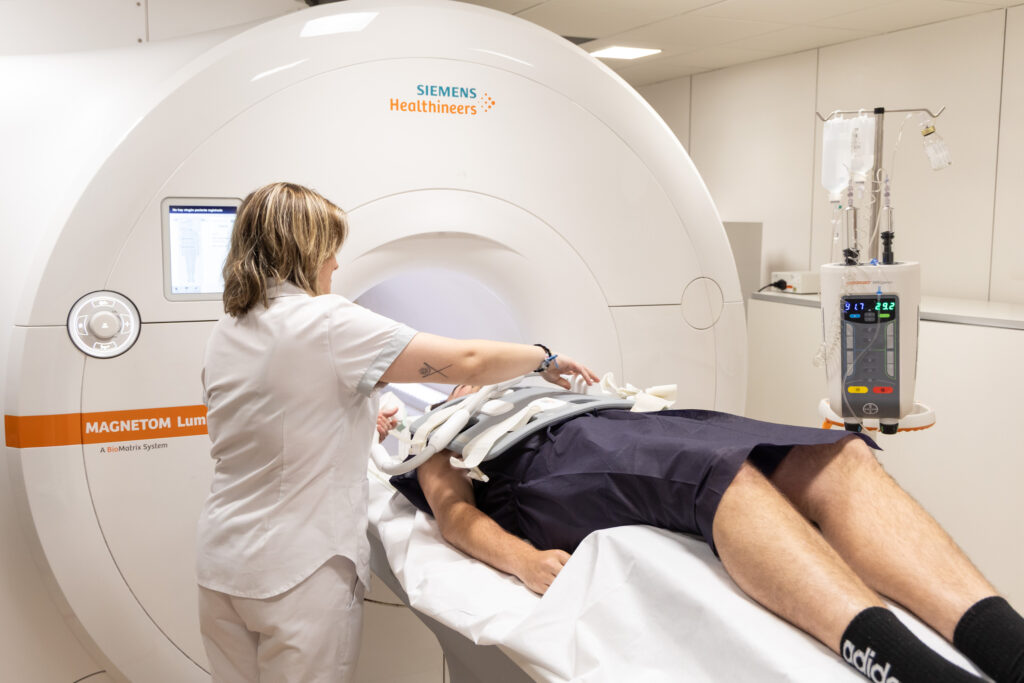Stress MRI
What is a Cardiac Stress MRI?
A Cardiac Stress Magnetic Resonance Imaging (Stress MRI) is an advanced test that evaluates how your heart functions under exertion or stress, similar to a traditional stress test, but with much more detailed images. It is a safe and non-invasive tool.
This test is a variant of Cardiac MRI that uses medication to simulate the effect of exercise on the heart. This allows doctors to observe how the heart responds to stress and detect potential problems that would not be evident at rest.
What is a Stress MRI used for?
Stress MRI is used to:
- Detect coronary artery disease (narrowing of the arteries that supply blood to the heart).
- Evaluate the amount of blood reaching the heart during exertion.
- Identify areas of the heart that receive insufficient blood (ischemia).
- Assess for cardiac damage after a heart attack.
- Examine heart function in patients with chest pain or angina.
How does high technology work in Stress MRI?
Stress MRI combines cardiac MRI technology with the administration of a pharmacological agent:
- Powerful magnetic fields: Uses a powerful magnet to generate detailed images of the heart.
- Radiofrequency (RF) waves: Radio waves are used to create images of the heart.
- Medication to simulate exercise: A medication (such as regadenoson) is administered intravenously to increase heart rate and simulate the effect of exercise.
- Gadolinium contrast: Gadolinium contrast is used to better identify areas with poor blood supply.
- Electrocardiogram (ECG): Electrodes are placed on the chest to monitor heartbeats during the test.

What does the procedure involve?
Stress Magnetic Resonance Imaging evaluates how the heart responds under stress conditions, without the need for physical exercise. The phases of the procedure include:
-
Prior preparation
Before the test, you should not eat for 4 to 6 hours before the procedure to avoid discomfort with the medication. It is also necessary to avoid caffeine at least 24 hours prior. If you have asthma, allergies, or respiratory problems, inform the medical professional to adjust medication if necessary.
-
During the test
During the test, electrodes will be placed on your chest to monitor your heartbeats with an electrocardiogram (ECG). Then, you will receive an intravenous medication that will accelerate your heart rate, mimicking physical exertion. While your heart responds to the medication, images of your heart will be taken at different times. Gadolinium contrast will be used to highlight areas of the heart with poor blood supply.
-
Upon completion
The procedure lasts between 30 and 60 minutes. After the test, your heart rate will return to normal, and you can resume your activities without restrictions.
Recommendations for the test
It is important to follow the preparation instructions carefully, such as fasting for 4 to 6 hours before the test and avoiding caffeine for at least 24 hours prior. Be sure to inform your doctor if you have allergies, asthma, or any respiratory problems, as this may require adjustments to the procedure or medication. During the test, if you experience any discomfort or symptoms, immediately inform the medical staff so they can assist you appropriately.
Are there any risks?
Stress Magnetic Resonance Imaging is generally safe, but it can carry some risks such as:
- Mild side effects: You may experience palpitations, a feeling of warmth, headache, nausea, or mild dizziness. These symptoms are temporary and usually disappear quickly.
- Allergic reactions to contrast: Although very rare, some people may have allergic reactions to contrast, such as itching or a rash.
- Conditions where the test is not recommended: Stress MRI is not suitable for people with severe asthma, uncontrolled low blood pressure, or advanced kidney disease. These conditions can worsen with the medication used for the test.
It is essential to inform your doctor about any pre-existing conditions to ensure safety during the procedure.
For your test to go smoothly, we ask that you arrive in advance of your scheduled time. This will allow us to complete the necessary administrative and clinical preparation.
Before the test, we will provide you with the Informed Consent form, a document with important information that you must read and sign.
If your appointment is for a Magnetic Resonance Imaging (MRI), it is crucial that you inform us about the presence of pacemakers, metallic objects, prostheses (including dental ones), tattoos, or medication infusion devices, such as insulin pumps.